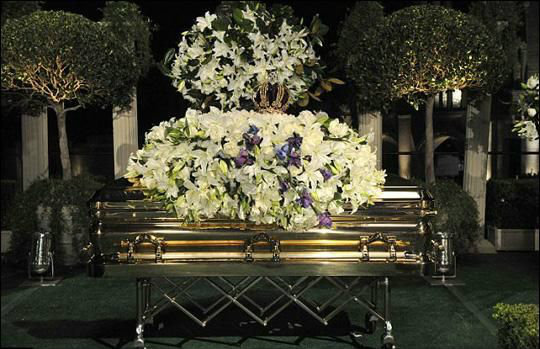Funeral Customs
葬礼
The burial of the dead is a matter taken very seriously by Chinese. improper funeral arrangements,it is believed,can wreak ill fortune and disaster upon the family of the deceased.
中国人对埋葬死者的葬礼非常重视他们认为,葬礼如果安排不当,会给死者的家庭带来厄运和灾难。
To a certain extent,Chinese funeral rites and burial customs are determined by the age of the deceased,the manner of his/her death,his/her status and postion in society and his/her marital status.
从某种程度上来说,中国人丧葬礼仪的规格是由死者的年龄、死亡的方式、社会地位和婚姻状况决定的。
According to Chinese custom,an older person should not show respell to a younger. Thus,if the deceased is a young,bachelor his body cannot be brought home but is left in a funeral parlour. His parents cannot offer prayers for their son: being unmarried,he has no children to perform these rites either. If a baby or child dies,no funeral rites are performed:the child is buried in silence.
根据中国的风俗,岁数大的人不能向年轻人致敬。因此,如果死者是一位未婚的年轻人,他的尸体就不能带回家中,而是要置于灵棚里。他的父母不能向他祝祷。由于没有结婚,也不会有孩子为他举行仪式。如果婴儿早夭,也不会举行任何仪式,孩子会被无声无息地埋掉。
Funeral rites for an elderly person must follow the prescribed form and convey relevant respell:rites befitting the person's status,age etc. must be performed even if this means the family of the deceased must go into debt to pay for them.
为老人举办的葬礼必须遵循既定的形式,必须要表现出相当的仪式,必须要举行符合死者的地位、年龄的仪式,哪怕这样做会让死者的家庭因此负债。
Preparation for a funeral often begins before death has occurred:if a person is on his/her deathbed a coffin will often have already been ordered by the family. A traditional Chinese coffin is rectangular with three“humps".The coffin is provided by an undertaker who oversees all the funeral rites.
死亡发生之前,葬礼就开始准备了。人还躺在床上奄奄一息时,家人可能已经预定好棺材了。传统的中国棺材呈四方形,有三处隆起。棺材有承办人提供,并由他监督所有丧礼的细节。
When a death occurs in a family all statues of deities in the house are covered with red paper(so as not to be exposed to the body or coffin)and mirrors removed from sight,as it is believed that one who sees the reflection of a coffin in a mirror will shortly have a death in his/her family. A white cloth will be hung across the doorway of the house and a gong placed on the left of the entrance if the deceased is male and the right if female.
如果家里死了人,所有的神像都要以红纸蒙面(不能暴露在尸体或棺材前)。所有的镜子都要移出视线之外,因为人们相信,在镜子里看到棺材的人自己家里不久会死人。屋子的门上会挂上一块白布,门侧会挂个锣,死者是男的话挂左边,是女的就挂右边。
Before being placed in the coffin,the corpse is cleaned with a damp towel,dusted with talcum powder and dressed in his/her best clothes from his/her own wardrobe(all other clothing of the deceased is burnt and not reused)before being placed on a mat. The body is completely dressed-including footwear, and cosmetics if female-but it is not dressed in red clothes(as this will cause the corpse to become a ghost):white,black, brown or blue are the usual colours used. Before being placed in the coffin the corpse's face is covered with a yellow cloth and the body with a light blue one.
尸体在放进棺材之前,要用湿毛巾擦干净,用滑石粉除去身上的灰尘,穿上他/她生前最好的衣服(死者其他的衣服都要被烧掉,不会再穿),然后放到垫子上。死者全身穿戴整齐,包括鞋袜,如果是女人的话,还要化妆,除了红色的衣服不能穿(这样会让尸体变成鬼),白色、黑色、棕色或蓝色的衣服都是很常见的。在放人棺材之前,死者要以黄布遮面,浅蓝色的布蔽体。

The Wake
守丧
The coffin is placed either in the house(if the person has died at home ) or in the courtyard outside the house(if the person has died away from home).The coffin is placed with the head of the deceased facing the inside of the house resting about a foot from the ground on finro stools,and wreaths,gifts and a portrait or photograph of the deceased are placed at the head of the coffin.The coffin is not sealed during the wake. Food is placed in front of the coffin as an offering to the deceased. The deceased's comb will be broken into halves,one part placed in the coffin,one part retained by the family
如果死者死在家中的话,棺材要放在屋里;如果死者死在外面,棺材要放在屋外的庭院里。放棺材时,棺下置两个凳子,使死者白勺脸朝向屋内,头离地约一英尺棺材前置花圈、礼物、遗像。守丧期间,棺材不能封口。棺前还要放食物作为给死者的供品。死者生前用的梳子要瓣成两半,一半置于棺中,一半由死者家人保存。
During the wake,the family does not wear jewellery or red clothing,red being the colour of happiness. Traditionally,children and grandchildren of the deceased did not cut their hair for forty-nine days after the date of death,but this custom is usually only observed now by the older generations of Chinese. It is customary for blood relatives and daughters-in-law to wail and cry during mourning as a sign of respect and loyalty to the deceased.
守丧期间,死者家人不能戴珠宝首饰,不能穿红衣服,因为红色象征着喜庆。根据传统,死者的儿女或孙子孙女在死者死后的40天不能理发,如今通常只有岁数比较大的中国人才会遵循这一习俗了。按照惯例,死者的血亲和儿媳们大声哭泣,以此来表现他们对死者的尊敬和忠诚。
At the wake,the family of the deceased gather around the coffin,positioned according to their order in the family. Special clothing is worn:usually white gowns and hats. Later-arriving rela-tives must crawl on their knees towards the coffin.
守丧时,死者的家人聚在棺材的旁边,按照家庭里的长幼尊卑排好顺序。他们穿上白色的丧服,戴上白色的丧帽。后来的亲戚必须面朝棺材跪下。
An altar, upon which burning incense and a lit white candle are placed,is placed at the foot of the coffin. .loss paper and prayer money(to provide the deceased with sufficient income in the afterlife)are burned continuously throughout the wake. Funeral guests are required to light incense for the deceased and to bow as a sign of respell to the family. There will also be a donation box, as money is always offered as a sign of respect to the family of the deceased: it will also help the family defray the costs of the funeral.
棺材前摆着供桌,上面燃着香和白色的蜡烛。守丧期间要不停地烧泊纸和纸钱(这是给死者在冥间使用的)。吊唁的客人要给死者上香鞠躬,以示对死者家庭的尊重。还会有个募捐箱:吊唁的客人往里投钱,一方面表示对死者家庭的尊重,另一方面也帮助他们负担丧礼的花销。
During the wake there will usually be seen a group of people gambling in the front courtyard of the deceased's house:the corpse has to be“guarded”and gambling helps the guards stay awake during their vigil;it also helps to lessen the grief of the participants.
在守丧期间,通常都会有一群人在死者家的前院里赌博。尸体必须有人卫护,赌博可以帮助护卫者保持警惕;也可以减轻参与者的悲痛。
The length of the wake depends upon the financial resources of the family,but is at least a day to allow time for prayers to be offered. While the coffin is in the house(or compound ) a monk will chant verses Buddhist or Taoist scriptures at night. It is believed that the souls of the dead face many obstacles and even torments and torture(for the sins they have committed in life)before they are allowed to take their place in the afterlife:prayers,chanting and rituals offered by the monks help to smooth the passage of the deceased's soul into heaven. These prayers are accompanied by music played on the gong,flute and trumpet.
守丧期的长短取决于死者家庭的贫富,但至少要有一天时间来作法事。棺材摆在屋里或院子里之后,会请来一位和尚和道士念诵经文。人们相信死者在黄泉路上要面临很多困难甚至折磨(因为他们在生前造了孽)。和尚和道士诵经能够帮助死者的灵魂早登极乐。诵经时有锣、笛和唤呐在旁边伴奏。












